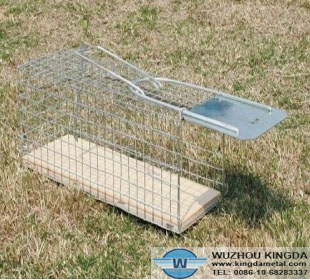Build an Animal Cage Trap with Welded wire cloth
Cage traps to capture wild animals are easy to use, safe almost anywhere, effective and can be quite expensive. However, building a cage trap is a simple project easily accomplished with ordinary hand tools and welded wire cloth for a fraction of the price you would pay at a retail outlet.
Cut a piece of 52-inch by 36-inch piece of 1-inch by 2-inch mesh, welded wire cloth into 3 pieces, one piece measuring 36 inches by 40 inches, another measuring 10 inches by 10 inches and the final piece measuring 9 inches by 13 inches.
Lay the large piece of welded wire cloth flat on the floor and position a 2-by-6 board across the 36-inch width of the cloth so one edge of the board is exactly 10 inches from the end of the cloth. The board will assist in making a straight 90-degree bend the width of the cloth.
Stand on the 2-by-6 board and grasp the end of the wire, pulling firmly to make it start bending around the edge of the board.
Tap the wire against the edge of the board with the rubber hammer to make it bend sharply until the wire is bent to 90-degrees along the entire 36-inch width.
Make a similar bend in the wire 10 inches from the opposite edge using the same technique.
Make the final bend at the mid-point between the first two bends resulting in the welded wire cloth ends coming together to form the four long sides of the trap.
Cut pieces of 14-gauge wire into 3-inch lengths. You'll need about 40.
Fasten the ends of the welded wire cloth together by bending one of the short lengths of wire around the wires at the edges of the cloth and twisting the short wire with a pair of pliers to crimp the wire tight. Put a twist of wire every 4 inches along the length of the seam. Trim the ends of the wire twists with wire cutters.
Fasten the 10-inch square piece of wire into one of the ends of the box using the 14-gauge wire twists.
Insert one end of the 9-inch-by-13-inch piece of welded wire cloth into the trap, then use wire twists to fasten the other end to the top of the trap forming a trap door that can be pushed up by an animal trying to get inside the trap.




